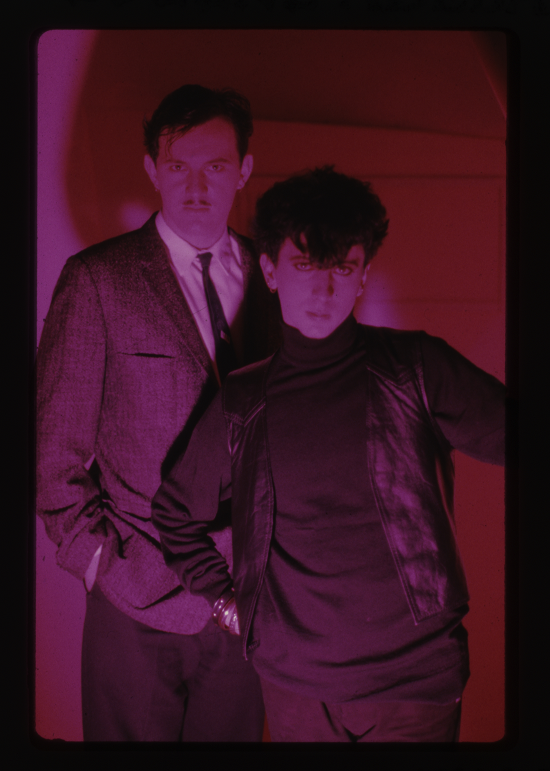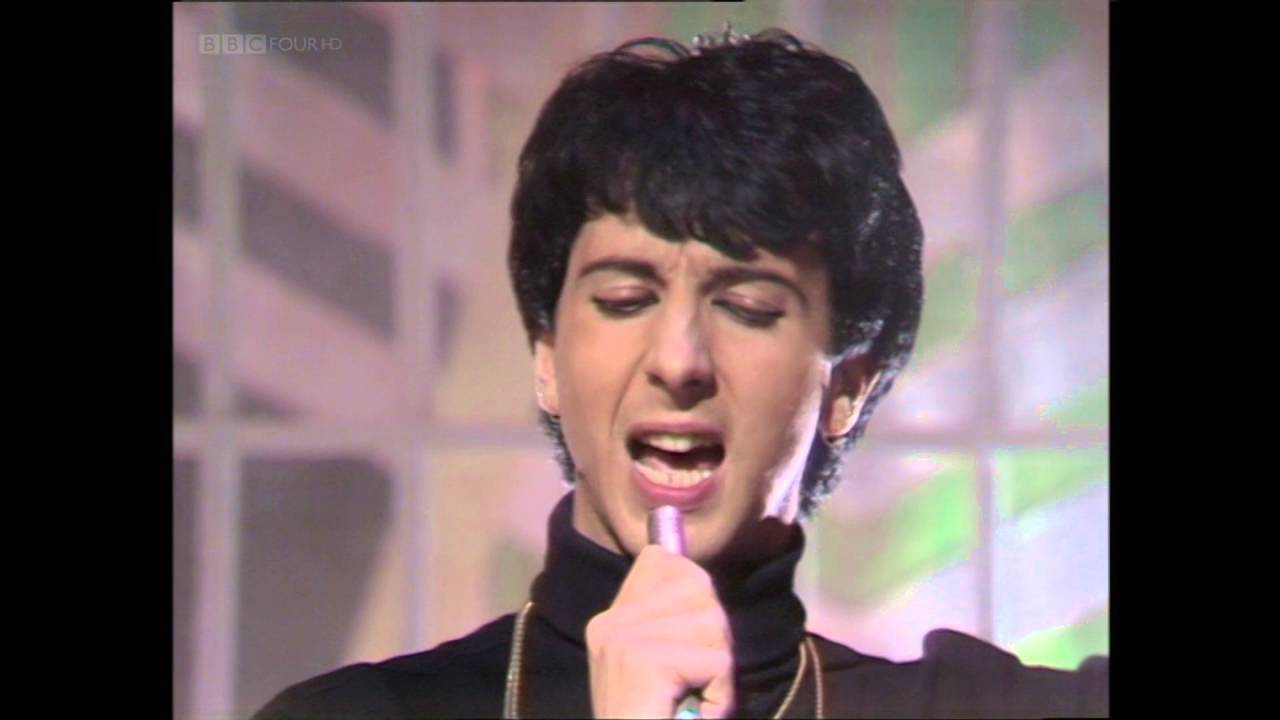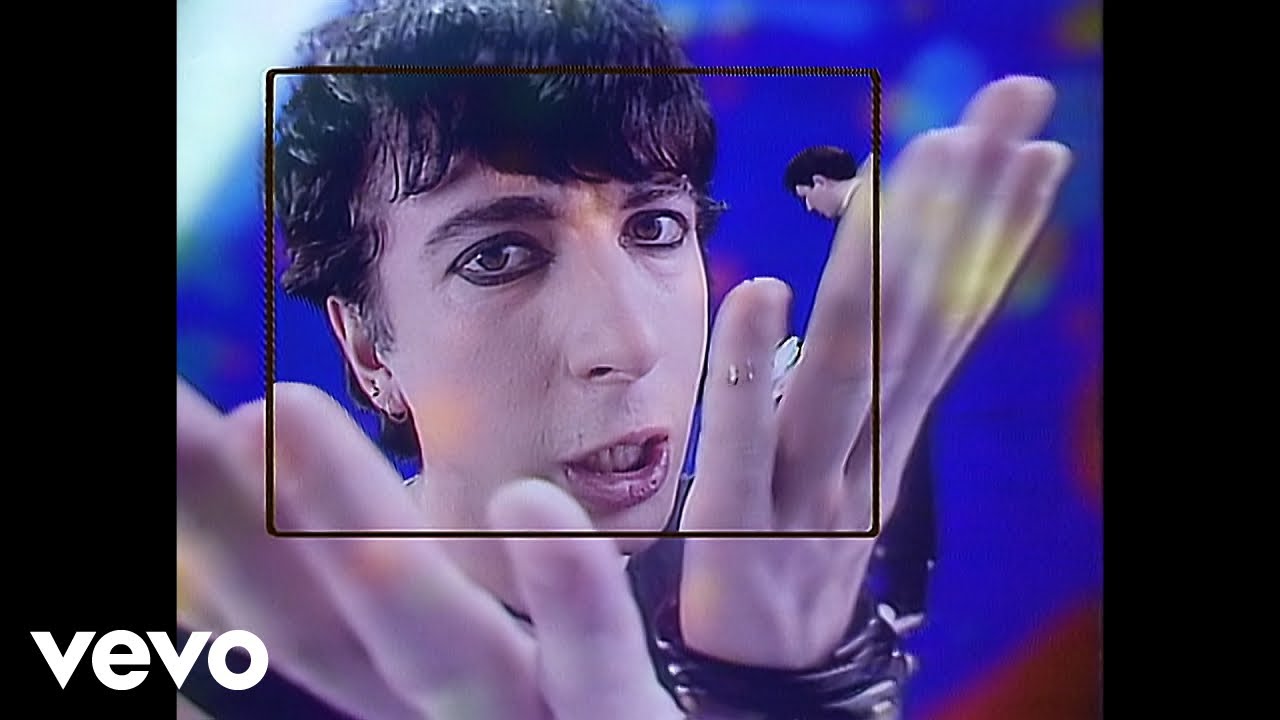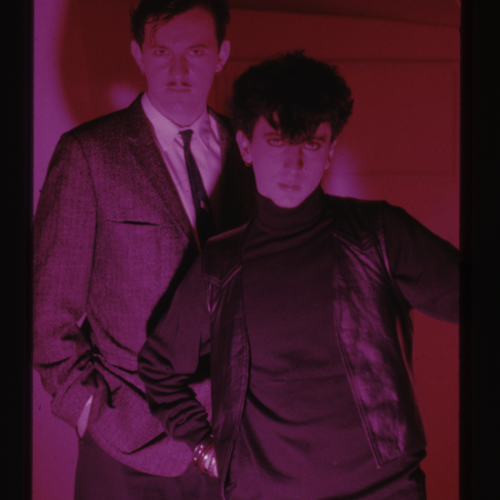Photo by Eugene Adebari
There are many different strands to Soft Cell’s debut album Non-Stop Erotic Cabaret. The record filtered the faded seaside sleaze of Dave Ball and Marc Almond’s upbringings, in Blackpool and Southport respectively, through the bold electronic experimentation that brought them together at art school in Leeds. At once, it captured the euphoria of legal ecstasy in early eighties New York clubs, the banality of Bedsitting in Thatcher’s England, and the sordid release of Soho at its peak.
All at once, Non-Stop Erotic Cabaret is tender, outrageous and daft. Even after four decades it’s hard not to be bedazzled by the melodrama of it all. Beyond the megahit ‘Tainted Love’ for which it’s most commonly remembered, it’s a record that’s constantly freewheeling its way down one nefarious alleyway after another.
It’s hard to overstate just how influential Non-Stop Erotic Cabaret has really been in the four decades since its release. As Dave Ball points out to tQ, though there had been the occasional alternative duo from America, like Sparks and Suicide, before Soft Cell Britain had never before produced a popular synth duo.
In the contrast between Almond’s dark flamboyance and Ball’s steely calm, they set a template that’s now as established as a four-piece rock band; while Erasure, Pet Shop Boys and Eurythmics might not sound like Soft Cell, in that regard they followed in their footsteps.
The picture that emerges through tQ’s conversations, not only with Almond and Ball but with a host of others who were involved in the record’s creation, is of a duo who were always going to break the mould. Though chart megastardom overtook them quickly, it’s Soft Cell’s forward-thinking edge that shines through the most.
Part One: Blackpool And Southport To Leeds And London
Two art students, Marc Almond from Southport and Dave Ball from Blackpool, meet at Leeds. The university’s burgeoning experimental scene, as well as their coastal upbringings, will go on to play a major part in the emerging Soft Cell sound…
Marc Almond: I think a listener can get a sense we were both from Lancashire seaside towns. There is an element of seaside postcard trash in our music. Terrible variety entertainers and cabaret duos playing club songs to a Bontempi organ, a singer out of tune giving it too much in a bad outfit and makeup. A sinister scary camp. I worked as a stagehand in my teens at the Southport Theatre and it was a strange carnival world where every day was a sexual assault by some low-on-the-bill pantomime variety act or seaside theatre impresario.
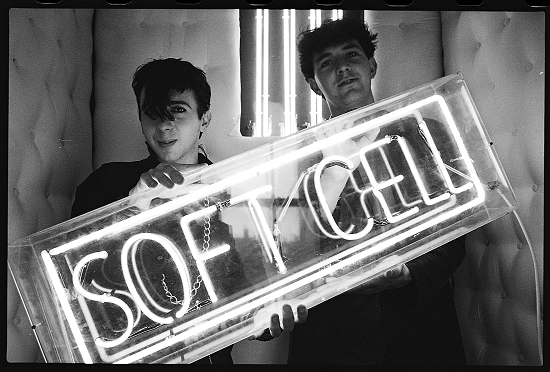
Photograph by Peter Ashworth
Dave Ball: I always loved it out of season. When you can walk along Blackpool Pleasure Beach and it’s empty and grey. That seaside melancholy rubbed off on Marc and me. It’s quite a northern thing really. Joy Division had it in abundance. Then, when I heard Kraftwerk, I went to buy a second hand synthesiser in the music shop in Blackpool.
Later, there was a sound room in the college in Leeds. Marc heard these weird bleeps and funny little songs I was messing about with. He had been the first person I spoke to there. Everyone else at the college was wearing box-fresh DMs, Wrangler jean jackets, but then there’s this guy with gold lamé trousers, a black leopard skin top and dyed black hair. I thought, “You’ve got to be in the art department”. I went up to him and said, “Where do I enrol?”
Josephine Warden, musician with Vicious Pink and Soft Cell backing singer: Leeds was buzzing in the late ‘70s. The Polytechnic, my favourite haunt, had bands on at least once a week. Johnny Thunder and the Heartbreakers, The Sex Pistols, Talking Heads, Suicide, I saw them all. Marc and I were two of those faces in the crowd. We just clicked. I think we clicked because we were both a bit different from the norm, well that’s what attracted me to him, he was fabulously, outrageously, madly different and stood out wherever he went. He shone. I liked that.
Marc Almond: I always looked on our early music as an extension of what we were doing at Leeds Poly. My transgressive performances, David’s music experimentation and his paintings and drawings that were statements on a twisted modern world. Soft Cell were very much a transgressive electronic punk band more in common with New York bands like Suicide, or Throbbing Gristle with catchy tunes. We were more about social comment and sometimes sardonic and satirical.
Dave Ball: At first, I was just doing background sounds for his performances that were like a weird Berlin cabaret. Then Marc said, “Could I have a go at singing them?” He was perfect as a frontman. You could see it straight away, the star quality, He had that kind of otherness that Bowie had.
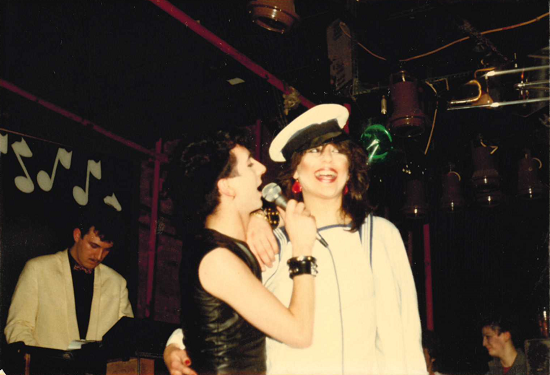
(L-R) Dave Ball, Marc Almond, Josephine Warden onstage. Photograph courtesy of Vicious Pink
Marc Almond: Leeds Poly was rebellious and extreme and encouraged you to be self-sufficient as an artist and against the grain. My tutor was Jeff Nuttall who had written a well-known pop subculture book called Bomb Culture. He was also a visceral performance artist and my confrontational nature had found its way into Soft Cell; we could be quite scary. Leeds Poly hadn’t really prepared us for corporate record companies, but they gave us a platform to be subversive.
Dave Ball: There was a pub called The Fenton where all the musicians used to hang out. A lot of the guitar bands in Leeds at the time, The Mekons, Gang of Four, Delta 5, they used to sneer at us, “Where are your guitars? Where are your drums?” There was no hatred or malice, but they thought we were a novelty act, something from the end of the pier. "Well," we said, "we’ll show you we don’t need them!"
Part Two: Memorabilia, Mute, Some Bizzare And Phonogram
After signing with Phonogram via Stevo Pearce’s Some Bizzare Records, debut single ‘Memorabilia’ is a chart failure but a cult club hit – enough for them to be offered one last shot at commercial success
Dave Ball: I think both [Mute’s] Daniel Miller and Stevo wanted to sign both us and Depeche Mode. We ended up with Some Bizzare and they ended up with Mute.
Daniel Miller, Mute founder: At that point I was already overloaded even with one artist. Wrong time, wrong place, really. Somehow, though, we agreed that we’d do a track, ‘The Girl With The Patent Leather Face’ for the Some Bizzare compilation album, and that it would come out before the first Depeche Mode single on Mute. Then after that, Soft Cell came and said they wanted me to produce a single, ‘Memorabilia’.

(L-R)Stevo Pearce, Marc Almond, Dave Ball, Brian Moss. Photo by Josephine Warden during the recording of Non-Stop Erotic Cabaret
Dave Ball: ‘The Girl With The Patent Leather Face’ seemed to be one of the favourites on the Some Bizzare album, so Stevo had pestered Phonogram to let us do a single. They finally relented and said, ‘We’ll give you the single with one option, and if it does OK you can do another one’. We’d had also had the Mutant Moments EP the year before, but that was never really a serious record. ‘Memorabilia’ was the first ‘proper’ single.
Marc Almond: It was based around a James Brown riff with a rap from me almost made up on the spot, a pean to obsession and collectable trash and a serial killer collecting little bits of you “to show you I’ve been there.”
Daniel Miller: We recorded in a studio in East London called Stage One with a really great engineer, Pete Maven. It was a very exciting time, none of us really knew what we were doing but we were all in it together with a sort of aesthetic in common. We’d all come in from the underground. Any professional recording studio was like a luxury at that time, and you’re constantly watching the clock so it was done fast. I think the process benefited from that. One day it was Stevo’s birthday. He’d been celebrating during the day, quite energetically, and arrived at the studio in an elated state. He ended up throwing up in the studio, which obviously is not conducive to work, particularly with electronics. There was a little recreational area and we laid him out on the snooker table to sleep it off.
Dave Ball: Daniel had this amazing ARP 2600 semi-modular with all these posh effects, a rolling space echo and sequencers and stuff. It was a revelation compared to my crappy old synth that I’d bought second hand. We also did a demo of ‘Tainted Love’ with him.

Photo by Peter Ashworth
Daniel Miller: I just don’t remember recording a demo of ‘Tainted Love’ at all! It’s quite possibly true. Maybe I just blanked it out because I didn’t end up doing the final version.
Marc Almond: ‘Memorabilia’ has since been called the first acid house record. I was most thrilled when Black guys in New York clubs and even on the street came up to me and said how much they loved that record.
Dave Ball: There was one massive club in Leeds, one floor was Black people, and one floor was all White kids, but ‘Memorabilia’ was getting played on both. The NME did a ‘New York Club’ chart, and ‘Memorabilia’ was in it. I think Phonogram must have seen this and thought, “Hang on, these two oiks from Leeds are getting played in New York? Let’s give these guys another chance.” That chance was ‘Tainted Love’.
Part Three: Tainted Love And Top Of The Pops
Soft Cell’s smash hit ‘Tainted Love’ is the best-selling UK single of 1981 and spends a then-record breaking 43 straight weeks on the US Billboard Hot 100. Combined with two appearances on Top Of The Pops, it catapults them to superstardom…
Dave Ball: The condition to doing another single was that Phonogram wanted to bring in their own producer, Mike Thorne.
Daniel Miller: I was disappointed at the time not to continue to work with them in the studio. I thought we’d all done a good job together, but I think Mike did a brilliant job though, and ‘Tainted Love’ was a brilliant production.
Marc Almond: Even Phonogram didn’t have a lot of faith in it really or us generally. We were odd and they didn’t get us. We were signed as part of a job lot with a band also managed by Stevo called B-Movie. It was the label’s decision to release ‘Tainted Love’ as the next single. A record company will go for the cover version as it’s the easiest option.
Mike Thorne: I was over in London with all my gear, which was quite substantial and included one of the first Synclavier systems., because I was recording the music for the film Memoirs Of A Survivor, and Phonogram called up and said, “Do you fancy doing a couple of singles while you’re over here?” They turned out to be B-Movie’s ‘Remembrance Day’ and Soft Cell’s ‘Tainted Love’.
Marc Almond; We did ‘Tainted Love’ in a day. The vocal is first or second take and I played the Syndrum sounds that became hooks. When it started to move into and up the charts it was a bit of a shock. Thrilling too, but life felt like it was never going to be the same.
Mike Thorne: We actually sat around at the control room after we’d finished mixing it and thought, “This could be a cult hit.” It ended up being a bit more than that! I think it was Number One in seventeen territories.
Dave Ball: For our first Top Of The Pops appearance the label were saying, “Well we’re gonna get a bass guitar and a drummer.” We were like, “What are you talking about? We’re a synth duo!” The public got it straight away, but the record companies, in this time of supposedly radical punk bands, didn’t get it at all. They told Marc, “You’re not allowed to wear bangles and you’re not allowed to wear eyeliner.” So Marc wore as much eyeliner as possible and as many bangles as he could.
Marc Almond: I remember them instructing me which camera to look to for the second appearance and telling me to ditch the look. I ignored them and was right to do so as, like Bolan and Bowie had illuminated my life, I since found out that I had such an effect on others. They felt they weren’t alone. I soon learned to use it to my advantage to see what I could get away with. The biggest false eyelashes and acting super effeminate, which brought out homophobia from the most unexpected corners sometimes.
Dave Ball: Marc always said he wanted to have the same impact that David Bowie had had on him when he did ‘Starman’ in 1972. He made it OK for boys to dye their hair and wear makeup, and I think Marc was a continuation of that tradition.
Peter Ashworth, Soft Cell photographer: They were really different personalities, Marc was waving, crazy and passionate. Dave was almost a machine, he was very shy, he wanted to just be there, do his thing and then get the hell out. It taught me what makes a good band, photographing Soft Cell, because then I saw the same thing with Eurythmics, and then I saw it again and again and again.
Marc Almond: The Top Of The Pops appearances totally transformed both of our lives but with it came a horrible side of fame. I’ve never liked crowds of people and I’m not able to be socially comfortable in many situations. I like to be quite private in many ways and I felt exposed, my life stolen from me and turned into something I didn’t recognise. It wasn’t mine anymore. It happened overnight. I’ve always said that I caused extreme reactions in people, they either wanted to marry me, mother me, murder me or fuck me. I attracted obsessives and stalkers, had untrue stories told about me to the press, became a freak magnet.
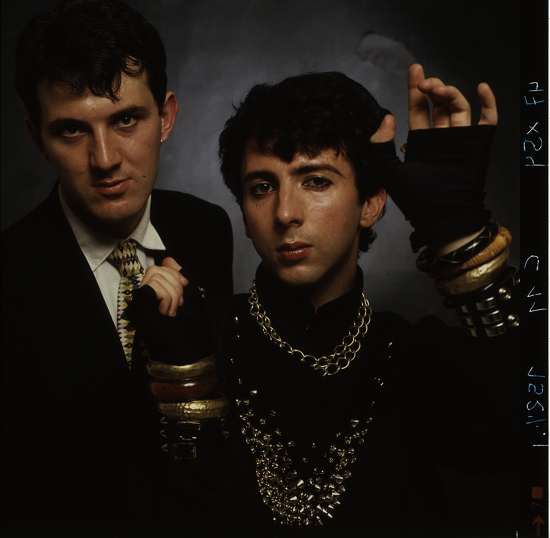
Photo by Paul Cox
Dave Ball: To be quite blunt about it, there was a lot of homophobia around. Marc was told by the press office, “When you’re doing interviews don’t talk about sexuality.” There would be pieces in Jackie like “Soft Cell: Which one do you fancy? Big, tall, hunky Dave or little scrawny Marc?” It’s hard to believe looking at me now, but we were pin up boys! It seems ridiculous now, him pretending to be a cute straight boy. And also, you wouldn’t print the lyrics of ‘Sex Dwarf’ in Jackie! It wasn’t little girls’ music!
Marc Almond: To say that there wasn’t an enjoyable side to it all too would be a lie. Ray Davies said, “Success is revenge” and that certainly is true. Payback for the bullies and those that dismissed me because I wasn’t good at school or academically. Also came some terrible homophobia even from within my record company, even from those I knew to be gay. I was certainly damaged by it at the time, and I handled fame initially very badly. I think we both did. Art students in a commercial corporate world. I had a breakdown.
Part Four: Non-Stop Erotic Cabaret
Soft Cell up sticks to New York City’s Mediasound studios to record their follow-up single ‘Bedsitter’ and their debut album Non-Stop Erotic Cabaret. There, the city’s burgeoning club culture and the prevalence of then-legal ecstasy begins to have an influence…
Dave Ball: Once we got the album deal, Mike said, “Do you want to come over to New York and do it there? Get away from being the new pop sensations and such nonsense?” Recording it was quite intense, and it was made worse because the record company from London phoned up and said, “You’re still Number One in Germany, do a TV show in Dusseldorf and you’ll be number one for another week, it’ll mean another 25,000 sales.” I was like, “We’re trying to get the bloody follow up single!” Marc had the idea; he had this friend of his back in Leeds who was tall with dark hair. No one knew what I looked like, all the focus was on Marc, so they went off to Dusseldorf and filmed it, the record stayed at Number One in Germany, and I managed to finish ‘Bedsitter’ and no one was any the wiser!
Marc Almond: I didn’t really think about the pressure to have another hit but the record company did. ‘Bedsitter’ was an obvious choice, one of Soft Cell’s best songs along with ‘Torch’ and ‘Say Hello Wave Goodbye’. A perfect record.
David Ball: We had to send the tape on the jet over from New York to London, and the phone goes again a couple of days later: “We don’t think it’s good enough.” Because ‘Tainted Love’ is such a basic pop song, I think they wanted something more obvious. Me and Marc are suddenly seeing our entire promising career disappear before our eyes. Marc just disappeared, went into this massive depression, and I was just furious. He emerged a few days later having met this woman Cindy Ecstasy, so his mood had changed a little bit. Luckily Mike talked the label round. It came out, and still went to Number Four.
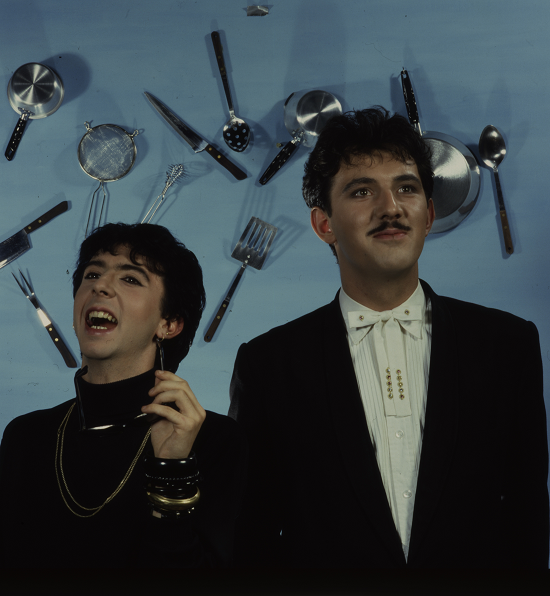
Photo by Peter Ashworth
Peter Ashworth: Shooting the cover for ‘Bedsitter’ was the first time Marc told me off, the pans kept dropping off the wall every time we’d go to take a shoot. I thought, the relationship has just changed… before that point I was in charge.
Tim Pope, Soft Cell video director: I loved the song’s themes, it reminded me of films like A Room At The Top, Marc trapped in this place forever, so I came up with an idea where his shirts matched the wallpaper so he disappeared into the apartment and became one with it. I can’t remember how I specifically got into the building, but I rolled into their label and told loads of lies about things I’d done, because I hadn’t done anything at that point, and sold them the idea. Marc and I immediately connected with our shared underground leanings. He told me about his days of being on stage in Leeds and eating dog food semi naked. I think we could hear sounds in the background of Stevo trashing the place. Even I thought at the time, “You’d better keep those hits coming baby…”
Peter Ashworth: Sometimes Stevo would ask me to do a shoot, I’d turn up at the record company with an invoice, and they’d say, “What the fuck? We didn’t give you permission for a shoot! What do you mean you’ve done a fucking shoot?!” Stevo got me into so much trouble, but I want to say right here and now that I adored Stevo. I think he was very important in the creation of what Soft Cell became. He was so fucking barking that whatever Dave and Marc did was nothing compared to what Stevo was doing, and that allowed them to get away with quite a lot because they’d always blame the bloody manager!
Brian Moss, Vicious Pink and backing vocals: When they asked us if we wanted to go to New York for two weeks, to do backing vocals for their new album, we were over the moon! On the flight, Marc told us about this legal drug called ecstasy, he said it feels amazing and you don’t get a comedown. I was a bit apprehensive, as that wouldn’t happen back home, and New York had a bad reputation for violence back then. Our parents were worried about us going. We were on a busy street and it was dark, carrying our suitcases and looking like tourists, trying to hail a cab to the apartment where we were staying, when two guys near us were punching moving cabs that wouldn’t stop for them.
Dave Ball: We were all staying in an apartment that was owned by Mediasound on the upper west side. We’d get a yellow taxi to the studio at about 10 in the morning, have breakfast, then start work at 11. We’d be finished by about six, so we had the evenings and the weekends to ourselves. That’s when all the fun began really.
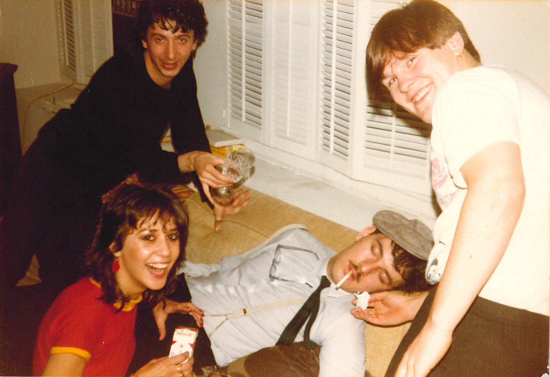
(L-R)Marc Almond, Josephine Warden, Dave Ball, Stevo Pearce
Josephine Warden: We all shared the same apartment, Stevo included. We had a lot of laughs and a lot of parties, I don’t remember any tension, not that I would have noticed to be honest on all that ecstasy…
Brian Moss: The apartment was nice. It had a TV that had 26 channels, wow! we only had BBC1, BBC2 and Yorkshire Television, back home, and those three ended at midnight. Later that evening we all took ecstasy and went clubbing till the early hours. We always got guest list, we got well looked after at the clubs we visited, which in our two weeks’ stay included Interferon, Berlin, Danceteria and many more. We had a night out with Billy Idol while we were there. I stayed up all night on that occasion and he told me over breakfast that he had overstayed his visa in the US, but was going to make it there and break into the US charts. He certainly did, so good for him!
Josephine Warden: The recording sessions would start with us all slightly buzzing from the ecstasy we had always taken the night before. It wasn’t long before we were using it in and out of the studio. The recording sessions were a continuation of our nights out in the clubs we’d just left at six that morning. The party just continued. I can still hear and feel the atmosphere when I listen to the album now.
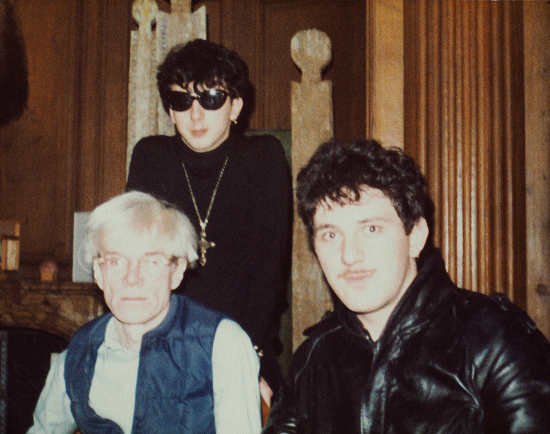
With Andy Warhol, photo courtesy of Dave Ball
Marc Almond: The whole New York Club and art scene had an incredible influence on us. We were taken to meet Warhol, one of my heroes, and nightclubs of the like I’d never been to. My first night in New York was in Studio 54 (although in its last throes). Drugs of course, amazing creative people, dance music like I’d never heard before, a totally wild and vibrant time to be there in New York. I felt at home for the first time. Of course that found its way into the studio and our first two albums are infused with that energy.
Dave Ball: There was a rumour Stevo spread around that the whole album was done on ecstasy, which was absolute nonsense. With the remix EP that was closer to the truth, but the original album was a totally drug free affair. We were very conscientious when we were in the studio, we knew it was a big chance and we didn’t want to mess it up. We’d have a blow out on Friday night and Saturday night, take it easy on Sunday then work through the week.
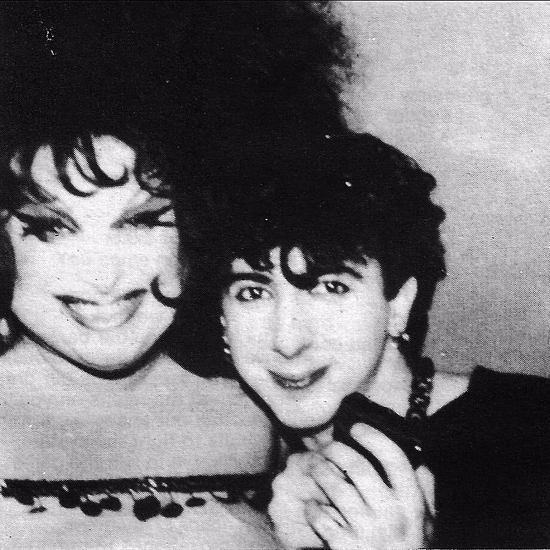
Divine and Marc Almond, photo courtesy of Dave Ball
Mike Thorne: In my case I never did drink and drugs in the studio because I had to keep a square head on to judge people’s emotional output. Weekends are a different matter entirely
Brian Moss: When we were called to do backing vocals, we had so much fun! I was the voice of the Sex Dwarf, on other songs Jose and I sang together, apart from ‘Seedy Films’ where Jose did a wonderful silky-smooth solo vocal. All this non-stop fun, from the clubbing, the ecstasy, the people we met, the wonderful city, that wasn’t as scary as we were made to believe, all made it onto the atmosphere of the now classic recording.
Harvey Goldberg, Mediasound Mix Engineer: I was struck by their commitment to the music they were making and how clear they were about their point of view. They seemed to know they were breaking new ground in electronic pop and dance music. The atmosphere in the studio was fun. They were also committed to a wicked sense of humour underneath their mission to break the rules.
Mike Thorne: I do think they certainly felt the pressure. I think ‘Torch’ was recorded when they were barely speaking to each other.
Part Five: Non-Stop Exotic Video Show
Soft Cell’s mystique is boosted further by a host of now-iconic imagery from longtime photographer Peter Ashworth, and a seedy tie-in ‘video album’ directed by ‘Bedsitter’’s Tim Pope. The full video for ‘Sex Dwarf’ remains banned from British television to this day…
Peter Ashworth: I was doing a major shoot with them every month or two. I did almost all of them from a basement just down the road from King’s Cross. A lot of photographers back then didn’t seem to be studio photographers, but I was infatuated with record covers and what they meant. I like the idea that you spend the entire time listening to the album and looking at the sleeve, trying to pick up clues. I always wanted to make worlds for the musicians.
Tim Pope: I remember going to Marc’s apartment in Soho and staring out of the window. It was like looking at the Non-Stop Erotic Cabaret album cover. I remember one night going to a strip club with him. The doorman flashed the person upstairs if you flashed money in your wallet, and if you didn’t pay up you got struck by a pin hammer hanging behind the bar.
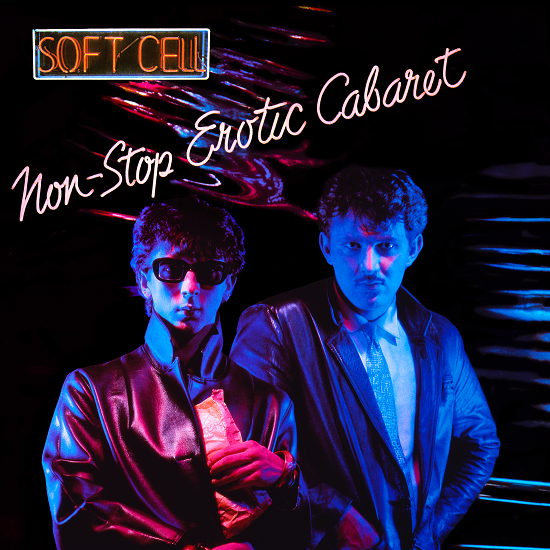
Photo by Peter Ashworth
Peter Ashworth: I shot polaroids all the time and Marc was always getting involved. He always wanted to see what he looked like so he could work it. He enjoyed being able to control the shoot, and I was giving him the system to allow him to do that. It honed the image down. The Non-Stop Erotic Cabaret sleeve was a really reduced idea, just a few colours, a piece of PVC, and you’ve got Marc pretending to hide something in his jacket. The whole thing still looks vibrant. If they’d been working with an NME black and white snapper, shooting on a Nikon, I think they’d have been a very different band. 40 years since Non-Stop Erotic Cabaret came out, that image still looks bloody fierce, which I think is really cool!
Tim Pope: Within three months of ‘Bedsitter’ they phoned me up and asked if I could make a video to ‘Say Hello, Wave Goodbye’, then shortly afterwards they decided to do a whole video album of songs, Non-Stop Erotic Video Show. We filmed a lot of them around Soho and it was great fun to dip into that lifestyle and cause as much trouble as we could. In that way I think Soft Cell and I were co- conspirators. Here was a band who had had massive, massive success with Tainted Love’, ‘Bedistter’ went to Number Four, but then we made ‘Sex Dwarf’!
Marc Almond: ‘Sex Dwarf’ is an ode to tabloid headlines and underground sex pop culture. I see it as a post-punk classic. It’s a subversive record and still has some relevance in today’s times. I like it more than I have in the past.

The video shoot for ‘Entertain Me’, photo courtesy of Tim Pope
Tim Pope: The reaction to ‘Sex Dwarf’ was hilarious! It has become a legend in its own lunchtime, mainly because people don’t seem to have seen the full version. I don’t even have a master copy of it. Really, all that happens is a lot of posturing, people rolling around in meat, me chucking handloads of maggots in which no one knew I was doing, a dwarf jumping out of a crate with a bondage mask on, and everyone having a whole load of fun. There’s a fantastic end shot of Marc as he leers at the camera. I put it into slow motion and noticed there’s a writhing maggot hanging from his lip. There were two studios where we were filming it in St. John’s Wood, and next door some ladies of a certain age were making an aerobics video in blue leotards. When the dwarf was dressed in his bondage gear, I took him on a leash with a zip up mask and decided to break into the other studio and walked through the back of the shot. I know that somewhere there will be a piece of video of these ladies were dancing to Madonna or whatever, with me walking through with a dwarf on a lead. It was just boys having fun!
Part Six: 40 Years Later
Contemporary reviews of Non-Stop Erotic Cabaret are mixed, but as the record reaches its fortieth anniversary its influence looms large…
Marc Almond: The critical reaction to Non-Stop Erotic Cabaret was pretty dismissive. Which hurt, of course, but wasn’t unexpected after Paul Morley came to visit us in Leeds for our first ever interview with a major music paper and trashed us in such a cruel way, it shocked and hurt me.
Dave Ball: He came, had a nice time, whiskey all afternoon, but we got the article and he basically just took the piss out of our name. He wasn’t exactly flavour of the month with us for a time. I think he did actually write an apology piece in the end…
Marc Almond: It hardened me up, if anything. I was naive and I had to get cynical and toughen up quick. I always felt the music papers at that time were lads’ mags, down on electronic music. They didn’t have guitars and it was for gays. There was a sneeriness laced with a not always obvious homophobia. They were laughing at me, at us. We were northern, stupid and didn’t wear the right clothes. When we came to play in London, other bands chucked coins at us.
Dave Ball: I think it bothered Marc more, because people like Steve Wright on Radio 1 would always take the piss out of his voice. He’d waver a bit, which personally I think adds to the charm, there’s a rawness. People would also take the piss out of the ’dun dun’ hook on ‘Tainted Love’ and try to belittle us because the sound was minimal and raw. I wasn’t bothered. I just used to think, “Dun, dun. Kerching, kerching!” If you could do that and get paid for it, you’d do the same wouldn’t you? We had the last laugh.

Dave Ball and Josephine Warden at the top of the Empire State Building, photo by Brian Moss
Marc Almond: Of course, some critics that knocked the album then now call it ‘seminal’ but viewpoints do change over time. Albums I didn’t like years ago I now love. The album was the other side of the coin of Margaret Thatcher’s Britain: I never felt it was political at the time, but it seems it now. Non-Stop Erotic Cabaret was the secret seedy life that went on behind the mask of Conservative Britain. It tells a story of a bored ordinary bloke seething with his life wanting more and looking for excitement and adventure in a red neon lit Soho world of red-light cabarets, prostitutes and sex dwarves, looking back at his youth and wondering what happened.
Tim Pope: Soft Cell did a Twitter Listening Party for Non-Stop Erotic Cabaret the other day. I hadn’t listened to the album in years. The album is so fresh, and so un-redeeming. It was just wonderful to have been around that music. I just feel very privileged to have been able to work at the start of my career with such a great band.
Harvey Goldberg: I’m always amazed when I hear various songs from Non-Stop Erotic Cabaret on the radio or in films, how relevant the music still sounds today. It’s definitely a highlight of my career and I am proud to be a part of it.
Brian Moss: The album stood the test of time; it still sounds great. I still have a Mediasound t-shirt, now full of holes. As for ecstasy, I never took it again until I worked on underground dance events in the early 90’s when Es started to become popular in the UK. I ended up trying half a tablet, I felt awful, it wasn’t the same and I’ve never tried it since.
Dave Ball: Non-Stop Erotic Cabaret was the first period of Soft Cell, really. It was our pop period, and by 1982 we were done and dusted with that. The next one, The Art Of Falling Apart was much darker and didn’t produce any hit singles. We were stupid, if we’d put ‘Torch’ on the second album, it probably would have done better. By [1984’s] Last Night In Sodom we’d just had enough, we were always falling out with the record company, disagreeing with Stevo and his ways, so we didn’t really have proper management. It was time for a break, so we said, “Let’s call it a day for a few years.” It ended up being a very long day!
A new reissue of Non-Stop Erotic Cabaret is out now in a number of formats, taking in a host of previously unreleased tracks, mixes, demos and live performances.

